London Museums Guide
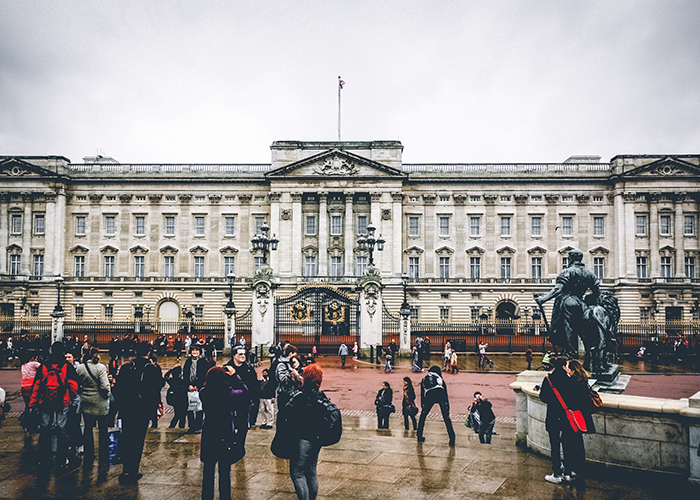
The British Library
Visit the interactive exhibits in the country’s most famous library.
Coming in 15 years late and 10 times over budget has finally been built and contains over 150 million items and is constantly growing as it receives a copy of every publication in the UK and Ireland . England has a long and proud intellectual tradition. It has produced some of the greatest literary figures, scientists and inventors. It has been part of every major cultural movement, and played a key role in the world’s most important historical events.
The British Library helps preserve some of this tradition, holding within its walls thousands of resources reflecting the ideas and events of the last few centuries. While it would take a lifetime to read all of its books, even a short tour is enough to fill its visitors with a sense of awe.
The British Library is spacious, relaxing, well lit, and generally designed to create the perfect atmosphere for study and reflection. It is easily accessible by public transport, and for students or scholars who wish to tap its resources, there are very affordable lodgings within walking distance.

The British Library houses a diverse range of collections and academic journals, to assist scholars and students from all fields and industries. These are regularly updated, and—in the fine tradition of scholarship begetting scholarship—play a key role in any research or study. From art history to chemical engineering, psychology to neo-classical architecture, the collections and journals represent the efforts of some of the great thinkers and most renowned experts to record and understand the world.
The British Library not only contains a variety of ideas, but presents it in a variety of forms. Aside from reading material—books, journals, magazines, newspapers—it also showcases paintings, audio visuals and other multi media materials. This makes the ideas come alive, and also allows visitors to appreciate the information from several angles. These are often updated. Some collections are also lent for a limited time, providing an excellent excuse and pay the British Library another visit.
The Charles Dickens Museum
The man considered to be one of the greatest English novelists of the Victorian Period, Charles Dickens was known for his works on attacks towards social evils, injustice and hypocrisy. Most of his works were about fiction and short stories. Familiar tales such as “A Christmas Carol, David Copperfield, and Oliver Twist” are only some of the written masterpieces that Dickens was well known for. People can visit the only surviving London home of Dickens which was opened as a Museum in 1925 and is still welcoming visitors from all over the world in an authentic and inspiring surrounding. On four floors, visitors can see paintings, rare editions, manuscripts, original furniture and many items relating to the life of one of the most popular and beloved personalities of the Victorian age.
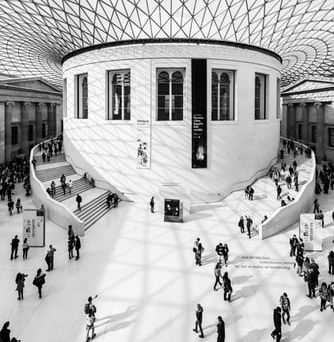
The British Museum
During the Victorian era there was a huge demand for the world’s historical artefacts and many of then can be found in the British museum.
Considered as the largest and most important museums in the United Kingdom , the British Museum showcases more than 7 million antique items that depict human history and culture, not just of the country but also of foreign lands. In fact, its collection has become so extensive that curators have been forced to store some artifacts beneath the museum for lack of space.
Some of its prized collections are the widely followed Egyptian mummies, the historic Elgin Marbles from the Parthenon, the exquisite, Roman glass Portland Vase and the medieval Lewis chess set.
The Tate Galleries
The Tate Modern
The Tate Modern is the most visited museum of modern art in the world and as well as its permanent collection houses constantly changing exhibitions. Housed in the former building of the Bankside Power Station, the galleries are based on several levels with the large open turbine hall used for larger and exciting exhibitions.
Access to the Tate Modern is best and most impressively achieved by taking the tube or bus to St Paul ‘s and then taking the millennium bridge over the river, leading directly to the Gallery.
The Tate Britain
The Tate Britain, on the other hand, features all forms of art created by British artisans. It boasts of works from renowned personalities like William Blake, Thomas Gainsborough and Dante Gabriel Rosetti. But by far, the Tate’s most popular piece is John William Waterhouse’s “The Lady of Shalott”.
The Science Museum
Located on Kensington Road , the Science Museum carries more than 300,000 items that depict major scientific achievements. Some of the more popular items in the collection are an operational example of the Difference engine invented by mathematician and computer scientist Charles Babbage; the Stephenson’s Rocket, a prototype of the Clock of the Long Now; and a DNA model created by British molecular biologist and neuroscientist Francis Crick, among others.
Bank of England Museum
Touring England would not be complete without going to the popular Bank of England Museum. Have a look at our guide to see why.
Touring England would not be complete without going to the popular Bank of England Museum. Being part of almost every tourist’s list of must-see places, it is a destination that receives thousands of tourists on a daily basis. Before visiting the historical museum, many tourists find it useful to locate an accommodation house near London ‘s famous historical spots. Ashlee House provides the perfect accommodation, while being few kilometers away from the key destinations.
The Bank of England Museum has been in existence for more than 300 years. It has, therefore, accumulated a vast amount of items and memorabilia associated with London and its history. Some of these collections include banknotes, furniture, and tools used by the Bank, which have been displayed to showcase the evolution of the Bank and the banking industry as well.
A visit to the bank is a memorable lesson in the country’s development as a financial and economic power. Tourists are also given the opportunity to lift a genuine gold bar, one of the several displays on the museum. Some find the interactive audio visual display on a foreign exchange market deal as very challenging. The museum also includes an audio tour about the officers and chief cashiers of the bank.
People go to the Bank of England Museum to know the people and events that have shaped the banking industry of England . There is a timeline that particularly describes 27 key dates about the bank’s history and other crucial events shaping the bank. These stories from the past tell how the bank achieved its current status.
There are certain days wherein the bank has special exhibitions and events. Residing in an accommodation house near the Bank of England Museum would make it easier to know if there are special events happening in the bank. The events range from exhibits about the Bank of England’s history to activities for children such as seasonal crafts and concerts.
The National Gallery
Britain ‘s premier gallery hosting a wide variety of Western European paintings dating from about 1250AD onwards.
The Portrait Gallery
At this museum at Trafalgar Square you can view an extensive — and eclectic — collection of paintings and photographs of Britain ‘s ruling classes over the last few centuries. One bonus: the top-floor Portrait Restaurant is among central London ‘s most inviting spots, with sweeping, sun-dappled views of the surrounding neighbourhood. It’s a perfect place for a late afternoon lunch.
The Museum of London
It documents the fascinating history of the city and its people from the prehistoric to the present day, and contains 1.1 million artefacts. To read more about this impressive museum and it’s collections, please look at our guide to the London Museum .
Fully appreciate London life in all its glory of 2000 years and head to the Museum of London , the world’s largest urban history museum! It documents the fascinating history of the city and its people from the prehistoric to the present day, and contains 1.1 million artifacts.
The London museum has 7 permanent exhibits. “ London before London ” captures its prehistoric past, and the lives of the small communities that once clustered around the Thames River . One of its representations of the River Wall show numerous swords retrieved from the water’s depths, which had been offered to the gods. Another collection from the Medieval period displays 47,000 items.
The museum’s other key features include a copperplate map of London and a tribute to the Great Fire, which raged through the city in 1666. Both can be seen at the Early Stuart London. The 18th century display shows clothes and fashion of the era, most notably an Indian cotton fabric with delicate patterns called calico.
Visitors can also take a peek at the darker side of Europe , where dozens of prisoners scratched their names on the pine walls of Wellclose Square Prison. Other exhibits from that period are the Victorian shops that lined the growing capital, London entertainers, and even Queen Victoria ‘s parliamentary clothes.
A museum dedicated to inspire a passion for London from visitors, the London Museum is a first-stop hub to truly taste the distinct flavors of this world-class city. Allow yourself to appreciate the beauty of modern day London from the cute cafes to your welcoming accommodations by reliving the progress and lengths the capital took to where it is now.
The Museum of London is open daily 10.00-18.00 Mondays to Saturdays and 12.00-18.00 on Sundays. It is closed on December 24-26 and January 1.
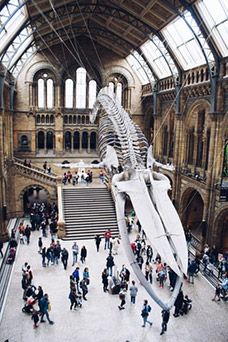
Natural History Museum
The cathedral-like museum has an unrivalled massive collection of animals, plants, minerals, and fossils pieced together by explanations enough to keep anyone occupied for weeks.
Natural History Museum —the ultimate sanctuary for the wonders of nature! It first opened in 1881, and this highly distinguished and well-loved museum has been educating and engaging visitors for over a century now. The cathedral-like museum has an unrivalled massive collection of animals, plants, minerals, and fossils pieced together by explanations enough to keep anyone occupied for weeks.
One of the most awe-inspiring displays is Dippy the diplodocus seen at the central hall. From there, guests can proceed into the two main areas, the Life and Earth Galleries, which are both packed with interesting natural oddities.
Guests can appreciate the history and evolution of the Earth featuring an astonishing walk-through rotating globe at one of the Earth Gallery displays. There are also exhibits of erupting volcanoes and fault line quakes that have shaped and transformed our vast landscape since the dawn of time. There is even a piece of the moon on display.
At the Life Galleries, guests can see monstrous dinosaurs, giant whales, sea creatures, reptiles, apes, birds, and more. Kids will particularly enjoy the “Creepy Crawlies” display. At the “Human Biology” exhibit, guests can literally be a mind reader and see how the human brain works.
A discovery center that houses the Investigate and EarthLab interactive exhibits give visitors a chance to get down and dirty. At the Darwin Center , curators and researchers are more than happy to answer questions regarding the 22 million specimens housed in this section. With all these exhibits and collections, and more, the Natural History Museum is one of the finest temples of science you could ever visit.
Educational and remarkable, the Natural History Museum is a great destination for children and adults alike. The Natural History Museum is open daily from 10.00 to 18.00, and 11.00 to 18.00 on Sundays. Last admission is at 17.30. They are closed on December 24-26.
Victoria and Albert Museum
The Victoria and Albert Museum boasts of more than 145 galleries and 3000 years’ worth collection of fine and applied art. To find out more about the colleactions at the V and A, have a look at our guide.
Feast on a treat of visual extravaganza at the greatest gallery in the world! The Victoria and Albert Museum boasts of more than 145 galleries and 3000 years’ worth collection of fine and applied art—unrivalled in both scope and diversity.
Originally founded in 1852 to educate and inspire British designers, the Victoria and Albert is now considered by many as the most influential museum of decorative art in the world. This seven mile-long museum has approximately four million remarkable artifacts from a rich mixture of cultures around the globe; varying from ceramics, fashion, furniture, metalwork, glass, sculpture, photographs, textile, paintings, jewelry, to twentieth century art and design.
Fondly called the V and A, it houses the largest collection of Italian Renaissance sculptures outside of Italy . Its recently erected British gallery showcases British design, highlighting the Great Bed of Ward as mentioned in William Shakespeare’s Twelfth Night, and James II’s wedding suit. Visitors will marvel at the captivating Dress Collection that features diverse historical clothing to the modern couture of the twelfth century. From massive sculptures to tiny earrings, the V and A Museum’s diverse collection appeals to people from all ages and walks of life.
In the fast-paced world of music videos, internet, and magazines, the Victoria and Albert Museum offers an alternative way of relaxing and allows visitors to see arts and culture from a larger historical perspective. It is definitely one of the must-visit tourist destinations for avid designers, artists, and art lovers of all ages.
So get out of your contemporary hotel & accommodation and marvel in the splendid world of art & design. The V and A Museum is located at Cromwell Road, London, and is open from 10.00 to 17.45 daily & 10.00 to 22.00 every Wednesday and last Friday of the Month. It is closed on the 24th-26th of December 2005.
Science Museum
Forget memories of trawling behind your teachers on museum trips when you were at school. The science museum is like an interactive adventureland of all sorts of interesting scientific questions like do aliens really exist, can I really meet myself (you can at the science museum!) could I make a building out of bubbles? Why not have a look at our guide to the science museum to find out what other interesting things you can find at the Science Museum .
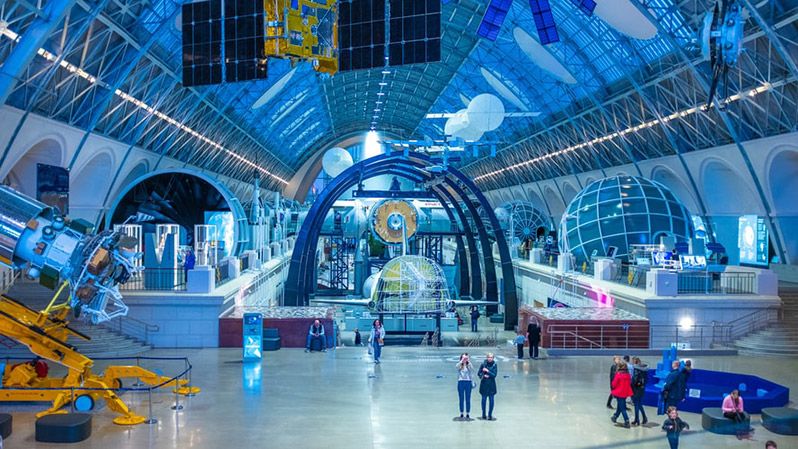
Enter London ‘s Science Museum , and you feel like a child again. Wonder, excitement, boundless curiosity and the sense of amazement at the magic behind ordinary things—these all come back.
Inside the Science Museum in London you will see a collection of remarkable objects and hear the stories behind them. View the famous Polar Express or the Aliens of the Deep, both on 3D. Imagine the possibility of finding extraterrestrial life, and making contact with a race from another planet, at the Science of Aliens exhibit. Experience the surreal feeling of meeting yourself at the Digital You, which generates an electronic version of yourself and lets you interact with this representation. Relive the glory (and terror!) of the Second World War, by looking at the most famous British fighter plane, stripped down to its former structure and deconstructed to reveal the complex mechanisms inside. And travel to the future and what could be the condo units of your great grandchildren through the Antenna: Building to the Limits exhibit, which show buildings made of bubbles.
These, and hundreds of other displays and exhibits, make the London Science Museum one of the best sights in the city. Kids will love it (and parents will love how they may go home more interested in science than they’ve ever been before). And even adults will enjoy being able to rediscover the magic and mystery of everyday things.
It is impossible to appreciate all that the Science Museum has to offer in one rushed tour. It is best to set aside an afternoon for this destination, so you can spend enough time fiddling with the interactive exhibits or examining the details on its intriguing displays.
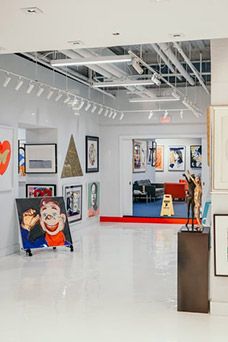
Saatchi Gallery
For artists and art admirers, who could resist sneaking a peek at the Saatchi Gallery? But before you immerse yourself in London ‘s contemporary art scene, check out our guide for a quick introduction!
Founded in 1985 by advertising guru Charles Saatchi, The Saatchi Gallery displays contemporary art that comprises over 2000 paintings, sculptures and installations from new British artists. The gallery aims to introduce the audience to cutting-edge young British art, and has produced innovative works by the Chapman brothers, Tracy Emin, Damien Hirst, Gary Hume, Sarah Lucas, Jenny Saville, Richard Whiteread and many other artists who became household names. Over the years, the audience for contemporary art has increased steadily. The gallery now receives over 600,000 visitors a year.
Despite a storage warehouse fire in 2004 which destroyed many of the valuable works from the collection, Saatchi has continued to display his personal collection, buying and dumping some of his purchases back to the market. Saatchi has been criticized for his overly enthusiastic collecting and when asked why he decided to open a gallery to the public, Saatchi simply said,” I like to show off art I like”.
Displayed works of art offer the most interesting collection in London . Bryan Griffiths’ Beneath The Stride of Giants is a Viking ship made entirely of recycled materials. The ship appears to be made of wood, but upon closer inspection turns out to be an assemblage of postmodern consumer excess. Other exhibition houses naked bodies, or formerly human bodies. Damien Hirst’s The Physical Impossibility of Death in the Mind of Someone Living is a seventeen-foot Australian tiger shark suspended in a glass tank.
The South Bank where the Saatchi Gallery is located is an important centre for culture and entertainment. Tourists visiting the Houses of Parliament are lured across Westminster Bridge to the London Eye, and to The Saatchi exhibition.
OUR OTHER GUIDES
London’s Nightlife Introduction & Essential Information Food And Drink Historical Sites Entertainment London’s Parks Days Out & Mini-Breaks Transport Sports Shopping

